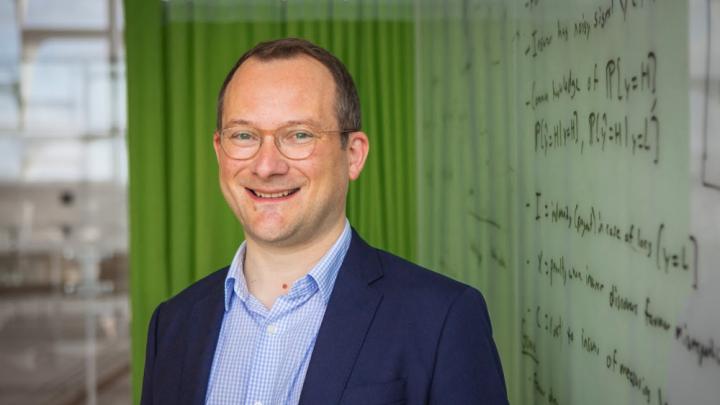David C. Parkes, Colony professor of computer science, will become dean of Harvard’s Paulson School of Engineering and Applied Sciences (SEAS) on October 15. An expert in the use of artificial intelligence and machine learning to design efficient markets and optimize economic transactions such as auctions, he succeeds Frank Doyle, who announced in December 2022 that he would become provost at Brown beginning this past July. Parkes is also co-director of Harvard’s Data Science Initiative, which engages academic disciplines and schools across the University. With this appointment, the University’s new leadership now includes a social scientist in President Claudine Gay; a life scientist in Hopi Hoekstra as dean of the Faculty of Arts and Sciences (FAS); an anthropologist and scholar of religion in Marla Frederick at the Divinity School; and a computer and data scientist to head Harvard’s efforts in applied science and engineering.
In the official statement announcing the appointment, Hoekstra praised Parkes in particular for his ability to bring together “people, disciplines, and industries around shared questions.” She described him as “a beloved teacher, advisor, and mentor who invests in preparing the next generation of leaders.” And, she noted, “he is a committed and insightful academic leader, experienced in addressing a broad range of opportunities and challenges facing SEAS, FAS, and the University.”
Parkes, a professor at Harvard since 2001, served as the SEAS area dean for computer science from 2013 to 2017. He co-chaired the SEAS committee that led the planning and building design for the school’s move to Allston; was a member of the faculty advisory committee that helped select his predecessor as SEAS dean; and helped create Harvard’s master’s degree program in data science.
“David is an outstanding convener and connector,” added President Gay. “His demonstrated ability to bring people together will enable SEAS—and Harvard—to identify challenges and opportunities emerging on rapidly changing horizons, and I look forward to working closely with him in the years ahead to advance our mission.”
Parkes said that he aims to “expand [SEAS’s] intellectual ambition around a few priority areas. I have some thoughts about what they could be”—he named artificial intelligence and sustainability as two “hugely important, technologically and scientifically deep, SEAS-spanning areas” that “also require a deep understanding of societal context to drive positive impact”—but added that building a “new narrative about who we are” as a school will come from conversations with colleagues.
Born in England, Parkes is a 1995 graduate of Oxford University, where he earned a master’s degree in engineering and computer science (and was a coxswain for his college crew). He came to the United States later that year, earning his Ph.D. in computer and information science from the University of Pennsylvania in 2001 (while racing road bikes in his spare hours).
At Harvard, Parkes has been recognized several times for his teaching and mentorship. As a junior faculty member in 2008, he won FAS’s Abramson award for teaching. In 2012, he was named a Harvard College Professor, FAS’s highest distinction for undergraduate teaching and advising, and he has received the McDonald award for excellence in mentoring and advising “for his selfless contributions to creating a welcoming, collaborative, and productive community of scholars in computer science.” (Unofficially, Meta founder Mark Zuckerberg ’06, L.L.D. ’17, also singled Parkes out for his teaching ability, stating during the 2022 launch of the Kempner Institute that his class on artificial intelligence (AI) “almost convinced me not to drop out.”)
Parkes is founder of the SEAS-based EconCS research group, which develops algorithms and AI that will have positive social and economic impact. And he is co-director of the Harvard Business Analytics Program, a nine-month certificate-granting course of study for mid-career professionals taught by faculty from Harvard Business School, SEAS, and the Graduate School of Arts and Sciences.
A fellow of the American Association for the Advancement of Science, Parkes spent the past academic year while on sabbatical in London as a senior research scientist at Google DeepMind, which is working to harness AI for solving real-world problems.
He is a member of the Lowell House Senior Common Room (as are President Gay and her husband Christopher Afendulis) and lives in Cambridge with his husband. Former FAS dean Michael D. Smith is serving as interim dean until Parkes assumes his new role.
Read the official announcement here.






